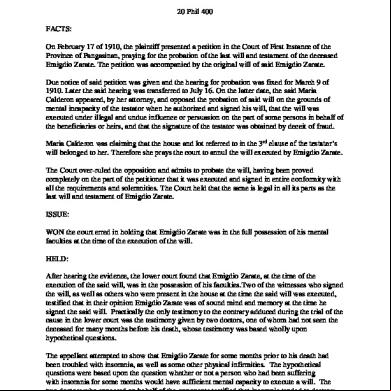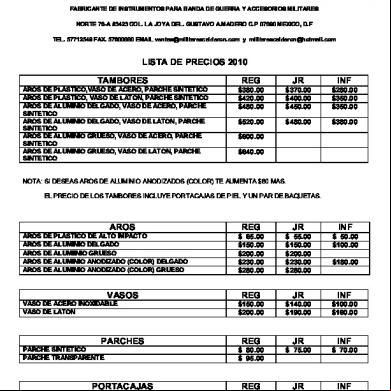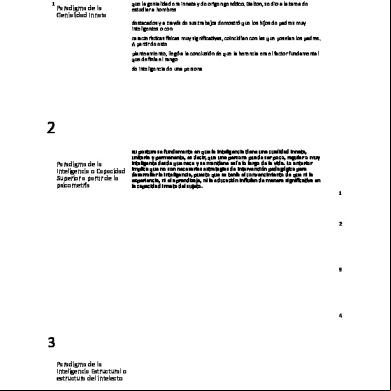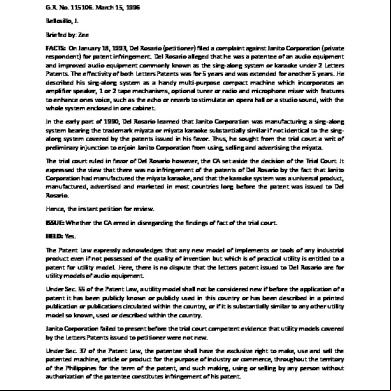14. Caguioa V. Calderon 6o2668
This document was ed by and they confirmed that they have the permission to share it. If you are author or own the copyright of this book, please report to us by using this report form. Report 3i3n4
Overview 26281t
& View 14. Caguioa V. Calderon as PDF for free.
More details 6y5l6z
- Words: 840
- Pages: 2
CAGUIOA vs. CALDERON 20 Phil 400 FACTS: On February 17 of 1910, the plaintiff presented a petition in the Court of First Instance of the Province of Pangasinan, praying for the probation of the last will and testament of the deceased Emigdio Zarate. The petition was accompanied by the original will of said Emigdio Zarate. Due notice of said petition was given and the hearing for probation was fixed for March 9 of 1910. Later the said hearing was transferred to July 16. On the latter date, the said Maria Calderon appeared, by her attorney, and opposed the probation of said will on the grounds of mental incapacity of the testator when he authorized and signed his will, that the will was executed under illegal and undue influence or persuasion on the part of some persons in behalf of the beneficiaries or heirs, and that the signature of the testator was obtained by deceit of fraud. Maria Calderon was claiming that the house and lot referred to in the 3rd clause of the testator’s will belonged to her. Therefore she prays the court to annul the will executed by Emigdio Zarate. The Court over-ruled the opposition and its to probate the will, having been proved completely on the part of the petitioner that it was executed and signed in entire conformity with all the requirements and solemnities. The Court held that the same is legal in all its parts as the last will and testament of Emigdio Zarate. ISSUE: WON the court erred in holding that Emigdio Zarate was in the full possession of his mental faculties at the time of the execution of the will. HELD: After hearing the evidence, the lower court found that Emigdio Zarate, at the time of the execution of the said will, was in the possession of his faculties.Two of the witnesses who signed the will, as well as others who were present in the house at the time the said will was executed, testified that in their opinion Emigdio Zarate was of sound mind and memory at the time he signed the said will. Practically the only testimony to the contrary adduced during the trial of the cause in the lower court was the testimony given by two doctors, one of whom had not seen the deceased for many months before his death, whose testimony was based wholly upon hypothetical questions. The appellant attempted to show that Emigdio Zarate for some months prior to his death had been troubled with insomnia, as well as some other physical infirmities. The hypothetical questions were based upon the question whether or not a person who had been suffering with insomnia for some months would have sufficient mental capacity to execute a will. The two doctors who appeared on behalf of the opponents testified that insomnia tended to destroy
the mental capacity, but that there were times, even during the period while they were suffering from insomnia, when they would be perfectly rational. Even itting that there was some foundation for the supposition that Emigdio Zarate had suffered from the alleged infirmities, the Court does not believe that the testimony was sufficiently direct and positive, based upon the \ hypothetical questions, to overcome the positive and direct testimony of the witnesses who were present at the time of the execution of the will in question. The evidence adduced during the trial of the case, shows a large preponderance of proof in favor of the fact that Emigdio Zarate was in the full possession of his mental faculties at the time he executed his last will and testament. Also, the lower court held that he executed his last will and testament without threats, force or pressure or illegal influence. The basis of the claim that undue influence had been exercised over Emigdio Zarate is that a day or two before the said will was made, it is claimed by the opponent, Maria Calderon, that the deceased promised to will to her a certain house (one-half of which seems to belong to her) upon the payment by her to the deceased of the sum of P300. The P300 was never paid to the deceased and the said property was not willed to the defendant herein. The agreement between Maria Calderon and the deceased, if there was an agreement, seems to have been made between them privately, at least at the time the will was made the deceased made no reference to it whatever. Those present at the time the will was made and the witnesses who signed the same heard no statement or conversation relating to the said agreement, between the opponent and the deceased. There is no proof in the record which shows that any person even spoke to the deceased with reference to the willing of the said house to the opponent. The theory of the opponent that the deceased did not will to her the house in question is a mere presumption and there is not a scintilla of evidence in the record to it.
the mental capacity, but that there were times, even during the period while they were suffering from insomnia, when they would be perfectly rational. Even itting that there was some foundation for the supposition that Emigdio Zarate had suffered from the alleged infirmities, the Court does not believe that the testimony was sufficiently direct and positive, based upon the \ hypothetical questions, to overcome the positive and direct testimony of the witnesses who were present at the time of the execution of the will in question. The evidence adduced during the trial of the case, shows a large preponderance of proof in favor of the fact that Emigdio Zarate was in the full possession of his mental faculties at the time he executed his last will and testament. Also, the lower court held that he executed his last will and testament without threats, force or pressure or illegal influence. The basis of the claim that undue influence had been exercised over Emigdio Zarate is that a day or two before the said will was made, it is claimed by the opponent, Maria Calderon, that the deceased promised to will to her a certain house (one-half of which seems to belong to her) upon the payment by her to the deceased of the sum of P300. The P300 was never paid to the deceased and the said property was not willed to the defendant herein. The agreement between Maria Calderon and the deceased, if there was an agreement, seems to have been made between them privately, at least at the time the will was made the deceased made no reference to it whatever. Those present at the time the will was made and the witnesses who signed the same heard no statement or conversation relating to the said agreement, between the opponent and the deceased. There is no proof in the record which shows that any person even spoke to the deceased with reference to the willing of the said house to the opponent. The theory of the opponent that the deceased did not will to her the house in question is a mere presumption and there is not a scintilla of evidence in the record to it.










